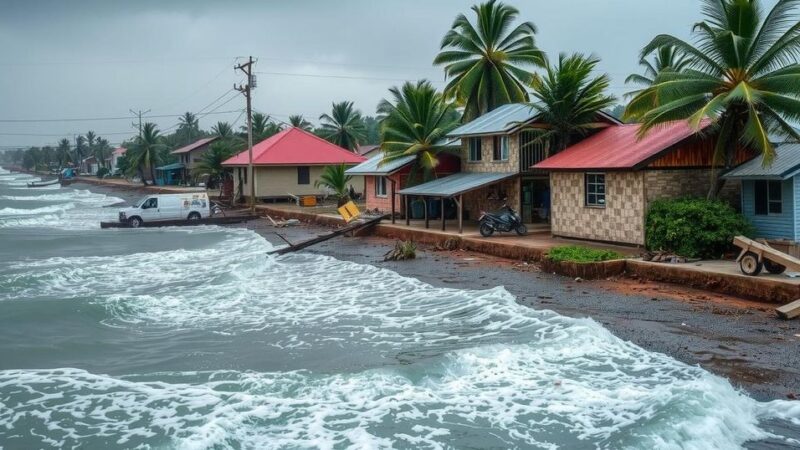Hurricane Helene has resulted in over 225 deaths and widespread destruction across North Carolina, South Carolina, and Georgia. With 700,000 still without power and numerous individuals unaccounted for, recovery efforts are ongoing amid significant infrastructure challenges. Health risks are rising due to compromised water supplies and storm-related impacts on medical facilities.
In the aftermath of Hurricane Helene, which has caused significant devastation across several states, reports indicate over 225 fatalities linked to the storm and its consequences. As of Friday, widespread power outages continue to affect North Carolina, South Carolina, and Georgia, with searches for those still unaccounted for ongoing in North Carolina. Residents, grappling with the destruction, express shock at the scale of damage; one resident likened his neighborhood to a war zone amidst continuing military presence to assist with recovery efforts. Efforts to restore normalcy face hurdles, as many popular fall travel destinations remain impacted. Western North Carolina, especially Asheville, is currently under a state of emergency, with non-essential travel discouraged. Essential roadways, such as the Blue Ridge Parkway, are closed, while some parks allow limited access. In a show of community support, the Carolina Weather Group is partnering with other weather-focused podcasts to host a telethon aimed at raising relief funds for the affected regions, with proceeds benefiting the American Red Cross. Furthermore, in Florida, the city of Holmes Beach has implemented a 45-day ban on vacation rentals due to the significant damage suffered on Anna Maria Island. Presently, more than 700,000 residents across impacted states remain without electricity, prompting utility companies like Duke Energy to deploy mobile substations to expedite power restoration efforts. Meanwhile, in Buncombe County, approximately 200 individuals are still unaccounted for, raising concerns about communication challenges amidst extensive destruction. Health risks are also escalating, as many communities lack access to safe drinking water, and the presence of hazardous bacteria in floodwaters poses further dangers. Compounding the issue, a critical plant that supplies a significant portion of the nation’s IV solutions has been rendered inoperative due to flooding. Meanwhile, the American Red Cross has noted disruptions to blood drives, urging individuals outside the disaster zones to contribute if possible.
Hurricane Helene has had a profound impact on the southeastern United States, particularly in North Carolina where the aftermath has resulted in significant casualties and widespread destruction. The storm’s devastation has led to a state of emergency in many areas, with search and rescue operations ongoing. As communities begin the arduous process of rebuilding, the ramifications of the hurricane extend beyond immediate physical damage, affecting public health, utility access, and local economies. The need for coordinated disaster response efforts is paramount, as evidenced by community initiatives aimed at providing relief and support to those affected. The situation serves as a stark reminder of the vulnerabilities faced by coastal and low-lying communities during extreme weather events.
In summary, Hurricane Helene has wrought catastrophic damage across multiple states, leading to a rising death toll and significant infrastructural challenges. As recovery efforts continue, community support initiatives are emerging, highlighting the resilience of affected populations. However, the ongoing health, safety, and communication difficulties underscore the importance of continued assistance and disaster preparedness measures to mitigate future risks associated with severe weather events.
Original Source: weather.com







